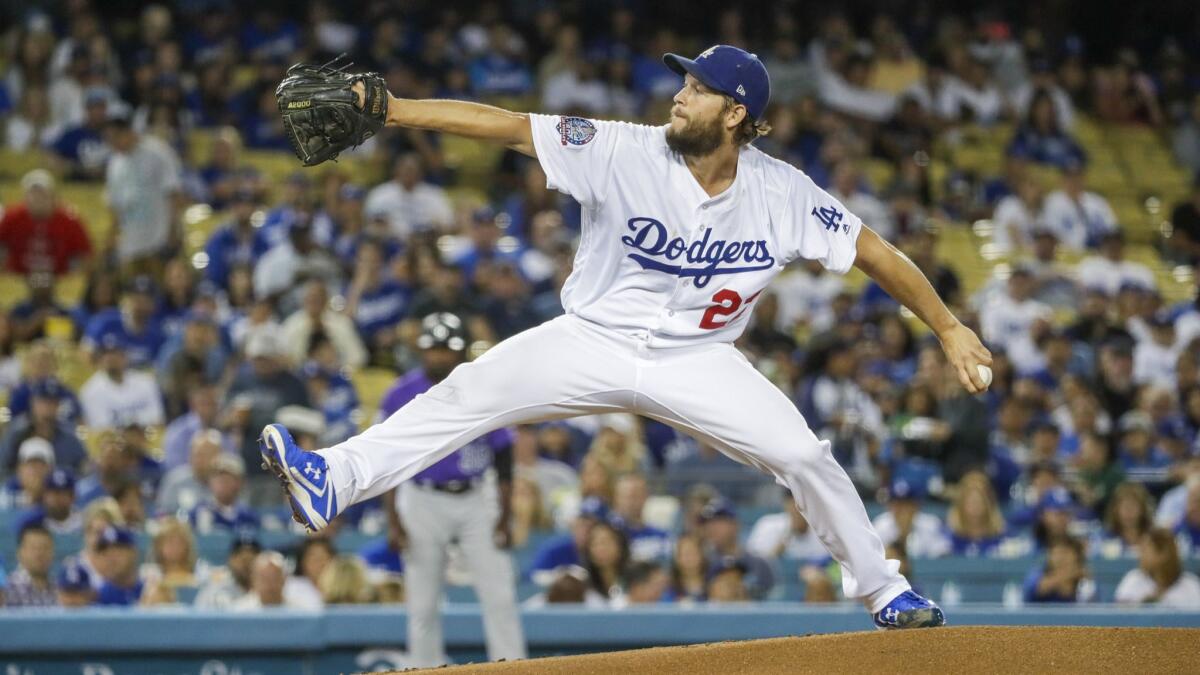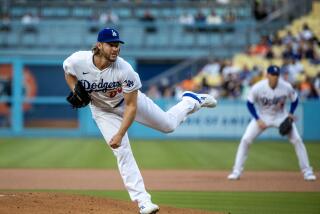Column: Dodgers’ Kershaw no longer has supreme skills but the heart and desire are intact

The overwhelming power he once possessed was breathtaking.
The hitters could know what was coming and it didn’t matter. He conveyed messages to them by how he pitched and how he comported himself on the mound: Here it is. Go ahead. Try to hit it.
The words, “We are young,” continue to be blasted out of the loudspeakers every time Clayton Kershaw takes the mound at Dodger Stadium, but he isn’t the pitcher he was in his youth.
If Kershaw used to be revered for what he could do with a baseball, he’s admired today as a 30-year-old for what he can’t.
The 94s and 95s that used to be displayed on the in-stadium radar gun are now 90s and 91s. Regardless, pitching coach Rick Honeycutt said, “He’s the guy that you want on the mound.”
Particularly in a game like the one the Dodgers played Tuesday night, when they played the second of their three games this week against the Colorado Rockies, the division rivals with whom they are locked in a dead-heat race.
Starting for the Rockies was Kyle Freeland, a second-year pitcher who has the kind of left arm Kershaw used to have. Kershaw outpitched the 25-year-old Freeland in a 3-2, 10-inning victory, which created a game and a half of separation between the first-place Dodgers and the second-place Rockies.
This on a night when Kershaw struck out only three batters and walked five, more than he did in his last seven starts combined. He positioned his team to win by limiting the visitors to two runs, one of which was earned, over seven innings.
“You would hope the magnitude of the game wouldn’t change the way you pitch,” Kershaw said. “I think consistently you try to be the same out there every fifth day, but there’s a little more intensity with each pitch just because of the situation.”
Freeland, who is 15-7 with a 2.95 earned-run average, was charged with two runs and five hits over 62/3 innings.
The Dodgers won because of something inside of Kershaw that can’t be measured by analytics or any of the tracking devices used by the organization. They won because he was smarter. They won because he was tougher.
He didn’t become frustrated when a third-inning error by third baseman Justin Turner allowed a run to score. He wasn’t discouraged when he threw a 90-mph fastball over the middle of the plate that Charlie Blackmon blasted over the center-field wall to move the Rockies in front 2-1.
“The mind and the heart, I just don’t think you can find much better,” Honeycutt said. “The competitor in him is never giving in. That’s just always been his M.O.”
Take the seventh inning.
Kershaw gave up a one-out single to Garrett Hampson, who advanced to second base on a sacrifice bunt by Freeland. Kershaw walked Blackmon to set up the most important at-bat of the game.
DJ LeMahieu stepped into the batter’s box with two outs and the score tied 2-2. After LeMahieu took the first pitch for a ball, Kershaw uncorked his trademark curveball. Turner dived to his left to corral the baseball into his glove and threw across the diamond for the third out.
Turning toward Turner, Kershaw pumped his clenched left hand and howled.
The pitch was Kershaw’s 97th. The crowd was familiar enough with Kershaw’s recent workloads to know that his night was over. As Kershaw returned to the bench, the fans serenaded him with a standing ovation.
“He just found a way to avoid that big inning,” manager Dave Roberts said. “He willed himself.”
Orel Hershiser, the ace of the last Dodgers team to win a World Series, applauded Kershaw for the adjustments he has made.
“When I look at him, what I admire most is that he wants to win,” said Hershiser, who works as a broadcaster for SportsNet LA. “He’s not egotistical about being in love with the traditional foundational pitches that he has. He’s about winning.”
Roberts said he noticed Kershaw became more open to change after suffering a back injury in 2016.
“As stubborn as he can be, self-admittedly, you have to evolve to continue to be great and he’s done that,” Roberts said.
He has done that by altering his plan of attack. He’s throwing more breaking pitches. He’s throwing less inside to right-handed hitters.
“I think his foundational pitch is still the fastball in to righties,” Hershiser said. “But if you go there 75% of the time and 25% of the time away, that’s a completely different at-bat. It’s not like you have to completely change and reinvent yourself.”
Kershaw has made 11 starts since the All-Star break and the Dodgers have won eight of them. He has a 2.17 ERA in that period.
And perhaps this is the version of Kershaw, who does as much or more with less, that can produce a different ending to the season.
Follow Dylan Hernandez on Twitter @dylanohernandez
More to Read
Are you a true-blue fan?
Get our Dodgers Dugout newsletter for insights, news and much more.
You may occasionally receive promotional content from the Los Angeles Times.







